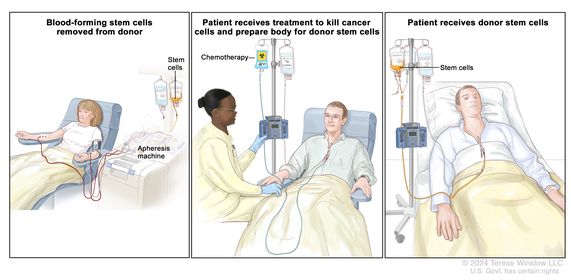peripheral blood stem cell transplant
(peh-RIH-feh-rul ... stem sel TRANZ-plant)
A procedure in which a patient receives healthy blood-forming cells (stem cells) to replace their own stem cells that have been destroyed by disease or by the radiation or high doses of anticancer drugs that are given as part of the procedure. The healthy stem cells may come from the blood of the patient or a donor. A peripheral blood stem cell transplant may be autologous (using a patient’s own stem cells that were collected and saved before treatment), allogeneic (using stem cells donated by someone who is not an identical twin), or syngeneic (using stem cells donated by an identical twin). Also called PBSCT and peripheral stem cell support.
